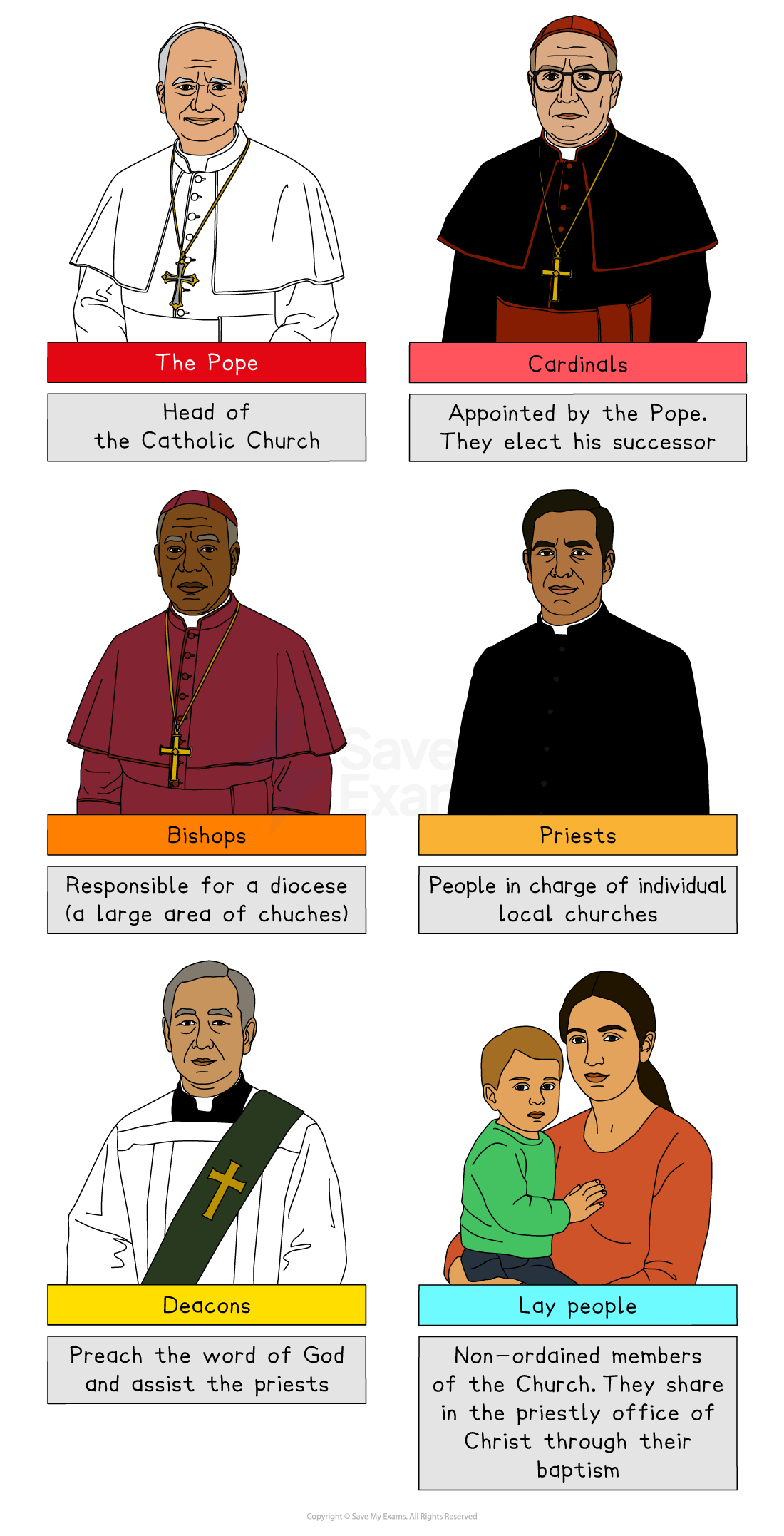Religious Leaders in Christianity (Cambridge (CIE) IGCSE Religious Studies): Revision Note
Exam code: 0490
The role & significance of the Pope and bishops
There is a hierarchy in the Roman Catholic Church, which means that there are different levels of authority and responsibility
A church hierarchy also exists in the Anglican Church. However, the Anglican Church does not accept the authority of the Pope

The hierarchy of the Catholic Church
The role and significance of the Pope
The Pope is the spiritual leader of the Roman Catholic Church and the Bishop of Rome
Catholics see him as God’s representative on earth
The Pope is viewed as the direct successor of St Peter, the leader of the apostles
This is because of the words Jesus spoke to Peter:
“You are Peter, and on this rock I will build my church … I will give you the keys to the kingdom of heaven, and whatever you bind on earth will be bound in heaven, and whatever you loose on earth will be loosed in heaven” (Matthew 16:18–19)
Catholics believe that these powers have been passed down in an unbroken line from Peter to the present day
They believe that Jesus is present in the papacy (the office of the Pope) to this day
This is why they accept the authority of the Pope
The current pope is Pope Leo XIV
The papacy is a source of authority for Catholics, who can turn to the Pope’s teaching as well as the Bible for guidance on how to live and what to believe
The Pope is an important world figure beyond the Catholic Church
He is the head of the largest denomination in Christianity
He is the spokesperson for the Catholic Church worldwide
He is a figure who often speaks out about moral and social issues, such as human rights and justice, poverty and environmental concerns
The role and significance of the bishops
The bishops are also seen as the successors to the apostles
They are the heads of the local churches and are in charge of areas of the church called dioceses
More senior bishops are known as archbishops and have more responsibility
The Pope chooses cardinals from the archbishops
These men have the task of electing a new Pope when the previous Pope dies or retires
The combined authority of the Pope and the bishops is called the Magisterium
The Magisterium has the same authority as the first apostles because of the unbroken line of command that has been passed down from Peter to today
This belief in the authority of the Magisterium is called apostolic succession
Catholics believe that the Magisterium is guided by the Holy Spirit
The role & significance of priests, ministers and pastors
Priests, ministers and pastors are the people in charge of individual churches
These people have several roles and responsibilities, including:
Leading the Sunday service
Preparing the sermon for the service so it teaches people about the messages contained in the readings and how they can apply those to their lives
Carrying out important services, such as baptisms, marriages and funerals
Visiting the sick, housebound and elderly and taking Holy Communion to them
Overseeing the day-to-day running and organisation of the church
Leading or organising events and groups, such as youth groups, Bible study groups or charity work groups
Taking the lead in deciding how the individual church should work in the local community and how it should support the worldwide mission of the Christian Church
Representing the Christian faith at local meetings and organisations, such as councils or school governing bodies
In the Catholic Church, the priest is responsible for conducting five of the Church’s seven sacraments:
Baptism
Reconciliation
Eucharist
Marriage
Sacrament of the Sick
Denominations with no ordained clergy
Some Protestant Christian denominations do not have ordained clergy
These churches share out the roles and responsibilities of priests, ministers and pastors among the people of the church
Everyone is a layperson, which means a non-ordained person
The reasons for this are:
All baptised people are seen as equal in the eyes of God
There is no special authority given to one person over another
All people have the same direct access to God: They do not need to access God through a priest or religious leader
This belief is known as the priesthood of all believers
Jesus is the link between people and God, not a priest or minister
The basis of this belief is the teachings of Peter and Paul in the Bible
St Peter said that every Christian is part of a “royal priesthood”:
“But you are a chosen people, a royal priesthood, a holy nation, God’s special possession, that you may declare the praises of him who called you out of darkness into his wonderful light.” (1 Peter 2:9)
St Paul said that the only mediator between God and humans is Jesus:
“There is one God and one mediator between God and mankind, the man Christ Jesus” (1 Timothy 2:5)
Worked Example
Name two leadership roles in the Church
[2 marks]
Answer:
One leadership role is the Pope [1 mark]
Another is a priest [1 mark}
Examiner Tips and Tricks
A c-type evaluation question on this topic might ask you to consider a statement such as
“Evaluate different views on whether clergy are needed for Christian worship.”
Make a list of the reasons why some churches have clergy (priests or ministers) and others do not, and think about what your own views are on this subject.

Unlock more, it's free!
Was this revision note helpful?
